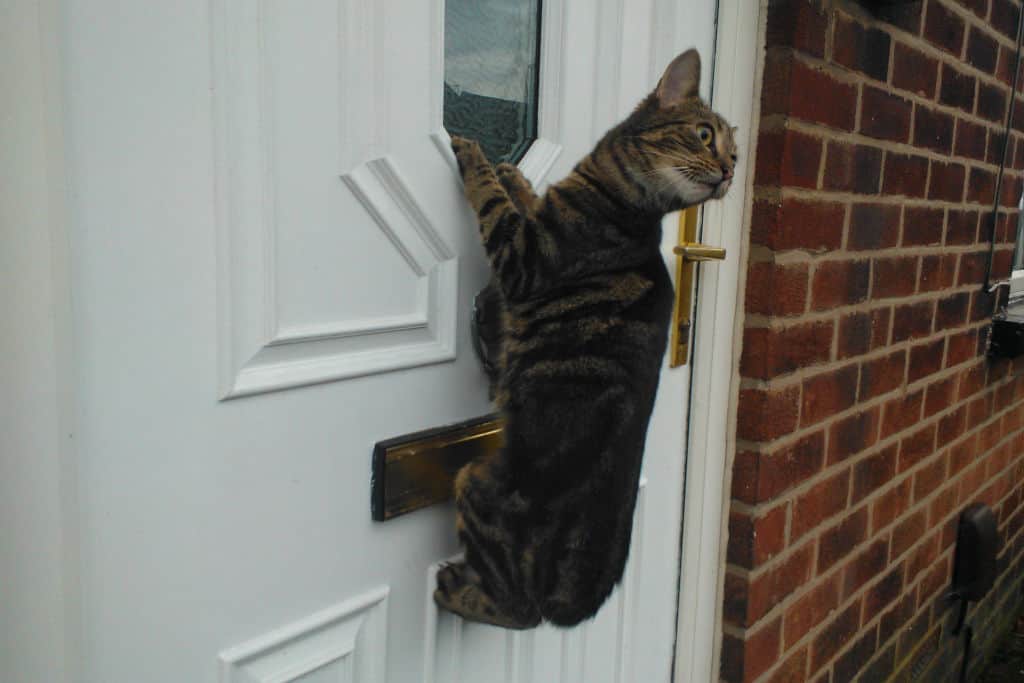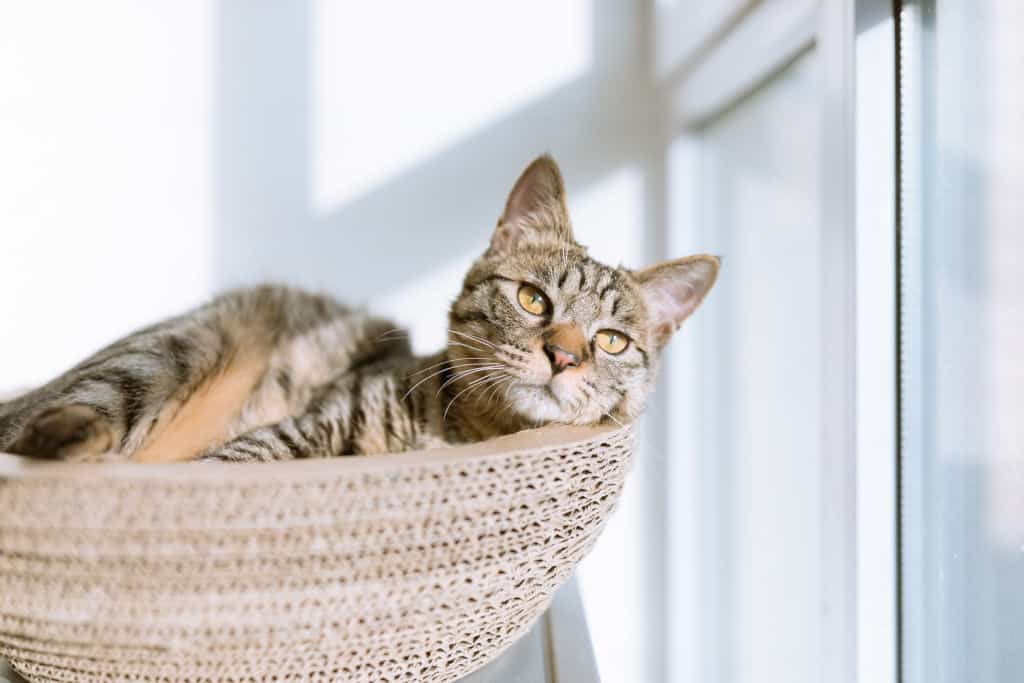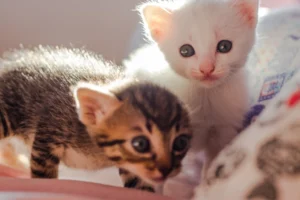Disclosure: We may earn a commission from helpful, relevant links in our content. No cost to you. See our privacy policy.
It’s not uncommon for a cat to go in and out all the time. While it may seem weird to us, it happens frequently. The most common answer is found in their behavior.
Cats’ meticulous revisiting to specific spots can also be attributed to their refined sensory perception. Certain outdoor stimuli, even subtle ones, such as the rustling of leaves or the flutter of a butterfly, can entice their curiosity over and over.
However, there are many more reasons why the cat may change its behavior and ask to go out the moment you let them in.

Why Do Some Cats Go In and Out Constantly?
Having and maintaining a territory is a common thing in all cats. A territorial cat may need to go in and out frequently to protect its territories inside and outside. This behavior is evident in stray cats.
They must go out regularly and briefly to check on things and, occasionally, to scent-mark.
They are keeping track of who is where, and keeping intruders out is an integral part of a cat’s social life. As a result, the cat will frequently mark things with scent, especially if it lives in an area where other cats use scent markings. However, it can also be a sign of stress.
A bored cat may want to go outside to see if anything is interesting. There could be a lizard or mouse out there looking for prey. If nothing is going on outside that the cat is interested in, it’ll want to come inside.
Because of this, some cat owners put in a cat door or leave a window or door partially open, so the cat can come and go as they please. However, this may not be safe if you live in a busy area because cats frequently get injured on the outside.
Keep in mind that changes in weather, particularly during transitional seasons, can attract different wildlife or offer varied sensory experiences, driving your cat’s desire to explore anew each time.
If your cat is male and there is an unfixed female cat outside, this could be a factor. Your unfixed cat may be attempting to mate as well.
Some cats may want to go outside if you switch their litter, change the setup, or still need to clean it. When we don’t clean it quickly enough, our cat will demand to go outside to do his business.
If you adopted an indoor/outdoor cat, your cat might want to go outside more frequently. The cat will meow at the door and run towards it to get out. This is normal cat behavior, and you should address it.
You must decide whether you want your cat to live indoors, outdoors, or as a mix of two. Remember, there are methods for keeping the cat inside and stimulated.
What Happens When You Let Your Indoor Cat Out?
Allowing your cats to go outside when they are not on a leash or in a very securely fenced area, depending on where you live, could result in your cats becoming sick, injured, or killed in any number of ways.
This is primarily true for the US urban areas, but not as much in the country, where many cats roam freely and aren’t getting injured that much. However, even in a country, your cat could get attacked by a stray cat or get sick in many ways (parasites, ticks, ear mites, etc).
Allowing your cat to go outside puts it in danger, especially if you live near a busy street. If you must let your cat out, consider creating a safe place for them outside, such as a patio, covered porch, or kitty tent.
To ensure your cats are safe and healthy outside, try to get them fixed, safely contain them on your property, and shield them from other animals that could harm them. However, this can be difficult to achieve.
In that case, there are many options you can try to contain your cat in your house, some of which are discussed further below in this article.

Can Cats Be Happy Indoors?
If the cat is well-fed and has plenty of toys and places to play, scratch, and exercise, it should be fine indoors. However, it might be a good idea to try to construct a secure and covered “catio” outside.
If you can’t buy or create a safe area for them on the outside, ensure they get a lot of exercise on the inside, have a bigger space to live in and roam, lots of toys to play with, and smells to sniff. This is good for a cat.
Contrary to some beliefs, indoor cats often have a longer lifespan than those frequently venturing outdoors, primarily due to reduced exposure to risks. Yet, to ensure they aren’t missing out on essential environmental enrichment, regularly rotating indoor toys and interactive gadgets can help replicate outdoor stimuli. Windows perches can be quite useful here.
There are many ways to increase the happiness of the inside cat, some of which are discussed below.
If you decide to let them out on occasion, consider walking them with a harness, especially if you live in a congested area. They could still leave the house that way but under your watch. Cats dislike having things put on them, so you’d have to train them to accept it.
If you let your cat out, consider putting them on a walk schedule. Choose a specific time to walk them so they understand that’s the only time they can go outside. Most cats learn when we come home and feed them, and yours will also know.
Remember that consistency is key when managing your cat’s outdoor time. Unexpected shifts in routine might lead them to be more vocal or insistent about going out, as cats thrive on predictability
How to Train Your Cat to Stay Inside?
Some cats may become uncomfortable inside or ask to go out for many reasons, some of which aren’t the best. You can try several things, such as training them or providing a safe outside area.
If your cat starts going outside more, try to have tasty treats ready inside by the door to reward them as soon as they return home from their adventures. This will encourage them to come inside more.
Open a window. Allowing them to get some fresh air is beneficial to keep them inside. I’d recommend building a catio, but the best you can do is a window insert that sticks out like an air conditioner. That could be useful.
Get a taped-up cardboard box with a hole cut out on one side and fill it with crispy leaves. Allow those to dry on the radiator first to ensure there are no bugs in them. This may appeal to some cats, and it is novel and intriguing.
Bring some plants inside and tie them up in various locations. There could be fragrant plants in your area. Just make sure they’re cat-safe. They will be intrigued by these strange new scents, which may deter them from venturing.
If you live in a house, the best option is to build a catio if there is enough space. Your cats could hang out outside in this enclosed space and enjoy some nature. Take a look at the image below.

Here’s how this particular one was built. It’s one of the bigger ones, but you can try smaller ones first if you live in a house. You could use PVC pipes and netting, but coat the lower areas with a one-inch mesh fence. Any animal with teeth or claws can tear the net, and chicken wire will not keep dogs or coyotes out.
Notice whether the cat likes anything in particular outside, whether it’s dirt, grass, dirt, or bushes. You can replicate what they like and have it on the inside. If they like grass, you can get some wheatgrass in a large box for the cat to lay in and munch on.
If your cats constantly request to go outside, they may be bored. Even if you already have some toys available, try getting some new enrichment toys.
Soundscapes, like audio recordings of birds chirping or nature sounds, played at a low volume can keep indoor cats engaged and mentally stimulated. Offering this aural enrichment can sometimes reduce their urge to dash in and out, as they feel more connected to the outdoors even when inside. Our blog post on cat sounds offers more advice on which sounds to choose, so be sure to check it out, as there’s a lot of useful information in there.
FAQs
Will your cat be OK if you leave it outside?
Depending on where you live and your cat’s behavior, the cat could be fine or hurt. It’s hazardous in a busy street area, but it may not be so in the countryside. Your cat could get sick, kicked by someone, run over by a car, eating by an animal. If unsure, keep it on a leash.
Why would your cat run around like crazy?
There could be many reasons for this behavior, but the most common one is pent-up energy and lack of exercise. Cats sleep most of the time to conserve energy for short bursts to catch prey. Playing with them for 15 minutes should be enough to eliminate the zoomies.
Do cats ever come back when they run away?
While there are many reports of cats returning home after days, weeks, or months, there is way of telling whether your cat will return. Most likely, they will return, so put up a poster on the street or a Facebook post looking for help.
Alex, a passionate animal lover, has experience in training and understanding animal behavior. As a proud pet parent to two dogs and three cats, he founded AnimalReport.net to share insights from animal experts and expand his knowledge of the animal kingdom.




